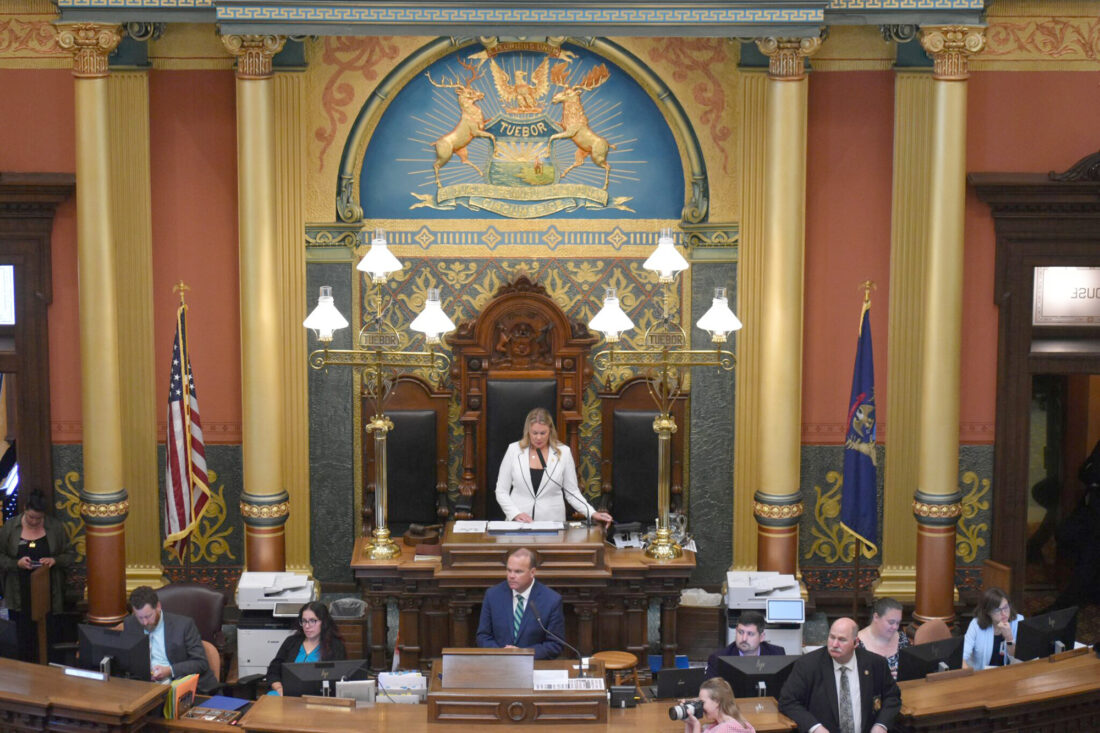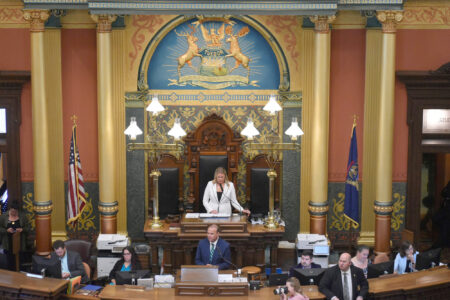State agency heads warn of effects of House budget cuts

The Michigan House of Representatives in session July 24. (Ben Solis | Michigan Advance)
As Michigan budget negotiations between the Republican-led House of Representatives and the Democratic-led Senate continue with 12 days left until a government shutdown, the heads of several state agencies are speaking out, warning that cuts within the House’s $78.5 billion proposal could severely impact their operations.
Michigan Department of Labor and Economic Opportunity Director Susan Corbin was among the latest to criticize the House’s budget, noting the proposal slashes 47% from the department’s current budget.
“These drastic cuts to budget and staffing will create a ripple effect across Michigan’s economy and the programs people depend on.” Corbin said in a statement Thursday. “Reductions in resources mean fewer protections and safety nets, fewer jobs, and fewer opportunities for hardworking Michiganders.”
Corbin pointed to several potential impacts from the cuts in funding, including a loss of $130 million in federal spending authority for the unemployment insurance agency. She also warned of severe cuts to Michigan’s Occupational Safety and Health Administration and drastic reductions in funding for both Michigan Rehabilitation Services and the Bureau of Services for Blind Persons.
“In a time of national economic uncertainty brought on by federal tariffs, these cuts would not only cause immediate job losses, but they would also create long-term economic harm for families and businesses across the state,” Corbin said.
Col. James F. Grady II, director of the Michigan Department of State Police, said the $40.2 million in budget cuts and the equivalent of 297.5 full time positions for post operations.
In a statement, Grady said the cuts would leave the department without sufficient funding to run trooper recruit schools and would require them to examine ways to reduce spending, including cutting trooper overtime, implementing vehicle and mileage restrictions and enacting potential layoffs from the trooper recruit school that will graduate in November.
Grady also pointed to the end of funding for the Secure Cities Partnership, eliminating trooper assignment to high-crime areas, and dedicated crime data analytics and aviation support to cities around the state experiencing violent crime.
“At a time when law enforcement needs more support in terms of personnel and training, this budget takes a major step backward in defunding these priorities,” Grady said. “As budget negotiations continue, I hope they will reconsider their position and make public safety a priority.”
In addition to the state police’s concerns, Elizabeth Hertel, the director of the Michigan Department of Health and Human Services, said the $4.95 billion in proposed cuts would drastically affect their ability to protect the health, safety and security of Michigan families.
With the House budget eliminating more than 1,600 full time equivalent positions in the department, Hertel said the proposal would lead to fewer child protective services workers investigating abuse and neglect complaints, fewer disease specialists responding to public health threats and fewer staffers investigating fraud, waste and abuse.
David Q. Worthams, the chair of the Michigan Civil Rights Commission warned that if the House’s budget becomes law, its staff would be cut by more than half, bringing back long delays and major backlogs in investigating civil rights complaints.
Phil Roos, the director of the Department of Environment, Great Lakes and Energy said the proposal is “simply irresponsible,” and would undermine EGLE’s ability to protect the state from pollution and potentially prompting the termination of critical public health and safety roles in areas like drinking water inspection, air quality permitting and contaminated site cleanup.
Michigan Department of Agriculture and Rural Development Director Tim Boring said the proposal slashes the department’s total budget by a third, including significant cuts to food safety work, emergency response and preparedness and customer service operations.
“At a time when our federal partners are pushing for state governments to pick up the load, the House budget plan defunds our basic functions that help Michigan farmers continue operations, keep Michiganders safe from illness, and more,” Boring said.
Despite heavy criticism, state Rep. Ann Bollin, R-Brighton Township, chair of the House Appropriations Committee, defended the House budget.
“State department heads rushed out statements to protect the bureaucracies they run while House Republicans are standing with taxpayers,” Bollin said in a statement “Our priorities are simple and unambiguous: strengthen classrooms for every child, keep our communities safe, and fix Michigan roads. This budget stops funding failed programs and layers of bureaucracy that do not deliver results and returns those dollars to visible priorities that improve everyday life.”
However members of the Michigan Democratic Party have already begun targeting Republicans in vulnerable districts across the state over proposed cuts to police and health care.
“Republicans in Lansing have again failed to stand up for the communities they represent,” House Minority Leader Ranjeev Puri, D-Canton, said in a statement. “Through this door-to-door program, we’ll hold these lawmakers accountable and make sure every voter in their district knows where they stand – and it’s to kick Michiganders off their healthcare and defund the Michigan State Police.”
In addition to a door-knocking campaign, the party has already begun running ads against state Reps. Jamie Thompson, R-Brownstown; Rylee Linting, R-Grosse Ile Township; Steve Frisbie, R-Battle Creek; Kathy Schmaltz, R-Jackson; Mark Tisdel, R-Rochester Hills; Ron Robinson, R-Utica; Nancy DeBoer, R-Holland; Timmy Beson, R-Bay City; and Karl Bohnak, R-Deerton.
Michigan Advance is part of States Newsroom, a national 501(c)(3) nonprofit. For more, go to https://michiganadvance.com.





